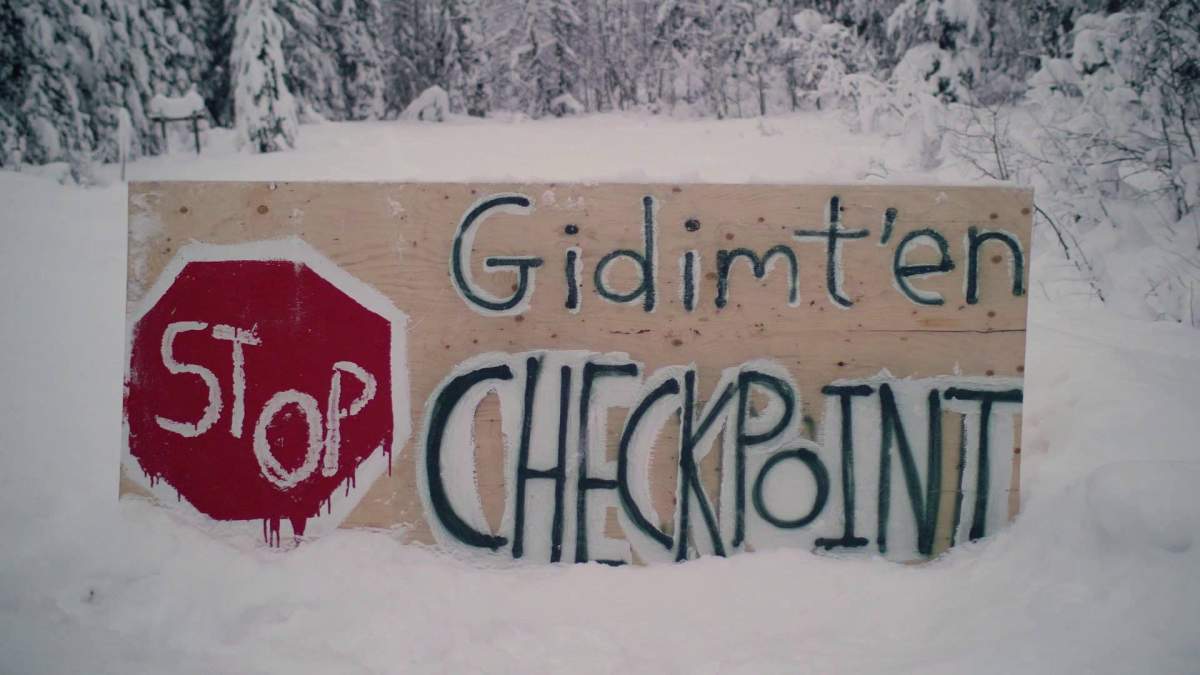On Jan. 8, 14 people were arrested in the Wet’suwet’en First Nation for allegedly failing to obey a court injunction that required the removal of a blockade.

The Unist’ot’en Camp was set up years ago to manage entry into the Indigenous territory. A blockade, called the Gitdumt’en access point, was set up further along the road. A December court injunction was granted in favour of Coastal GasLink, ordering protesters to remove the blockade.
READ MORE: Rallies held in support of anti-pipeline protesters arrested in northern B.C.
The order was later expanded to include the Morice West Forest Service Road, on which the Gitdumt’en access point was located.
Over the weekend, RCMP vehicles and tactical units were spotted in the nearby towns of Houston and Smithers. The conflict came to a head on Monday when RCMP went to the blockade.
What is the Coastal GasLink project?
The Coastal GasLink pipeline project aims to connect fracking projects in the Peace Region to the upcoming $40-billion LNG Canada plant in Kitimat.
Coastal GasLink is a subsidiary of TransCanada Corp.
The pipeline route travels through Wet’suwet’en First Nation territory, and the nation’s elected leaders signed a benefits agreement with the province for Coastal GasLink in 2014.
Protesters say the project infringes on Aboriginal title, citing the 1997 Delgamuukw Supreme Court of Canada ruling. During that case, the court found that the Wet’suwet’en had not given up title to 22,000 square kilometres of territory.
Coastal GasLink has previously said it consulted with hereditary chiefs for more than five years and secured 20 project agreements with elected First Nations councils all along the pipeline route.
The elected officials in the Wet’suwet’en First Nation have signed a project agreement with Coastal GasLink.
WATCH: Pipeline protesters interrupt Morneau during talks about LNG project (Dec. 2018)

Who was arrested?

Get breaking National news
While there are some who support the pipeline, activists and demonstrators who disagree with the project were arrested at the Gitdumt’en access point, including Molly Wickham.
One person was released Monday evening on a promise to appear, RCMP spokesperson Cpl. Madonna Saunderson said, and the others were held to appear before a justice. Wickham says seven were released on Tuesday, and six were still in custody.
Saunderson said they appeared before the justice in relation to “alleged violations of the B.C. Supreme Court injunction.”
Wickham said in a testimonial on Facebook after being released that the RCMP had chainsaws to dismantle the blockade, which threatened the safety of those at the blockade.
“They came straight at us,” she said. “A lot of what you’ve seen is not the extent of the violence that happened there.”
Carla Lewis, a spokesperson from the Aboriginal group at the camp, said one person suffered a physical injury to his wrists and everyone at the blockade was “emotionally shaken.”
Were the media blocked from reporting on the arrests?
According to journalists from APTN and CBC, several people were blocked from entering the region.
“We have no idea what’s happening,” Wickham said in her testimonial, noting that no one can get in or out of the region.
Media who were already on the side of the blockade are still there, but journalists attempting to enter were not allowed in.
Saunderson told media at the time that the area was part of a temporary exclusion zone, and no one was allowed to enter.
The Committee to Protect Journalists issued a statement regarding the exclusion zones.
“Authorities in Canada should immediately end the arbitrary restrictions on journalists covering the police breakup of the pipeline protest,” said CPJ North America Program Co-ordinator Alexandra Ellerbeck.
“Journalists should be able to freely cover events of national importance without fear of arrest.”
Reports of service down
According to people who were there, the already spotty Wi-Fi connection went down around the time the RCMP arrived.
“Wifi crashed just before police arrived,” Star Vancouver reporter Perrin Grauer wrote on Twitter.
Wickham blamed RCMP for the loss of service.
“They cut off our internet access so that we couldn’t post anything, so at the time of the incident we couldn’t post to the outside world,” Wickham said.
RCMP disputed that accusation in their statement on Monday, saying the area is extremely remote and even police had limited access to communication, other than their radios.
Similar accusations were made against police during the Dakota Access Pipeline protests in 2016.
What happens next?
Lewis said RCMP are continuing to clear the road towards the Unist’ot’en camp as of Wednesday morning.
“Our hereditary chiefs are also meeting with the RCMP this morning to continue trying to negotiate a peaceful discussion and the safety of our people,” Lewis said.
But she said she was worried that the RCMP would continue to arrest people when they get to the camp.
Support from around the country
On Tuesday, thousands marched in solidarity with the Wet’suwet’en protesters.
In Vancouver, hundreds gathered at the B.C. Supreme Court, including federal Green Party Leader Elizabeth May and environmentalist and scientist David Suzuki.
WATCH: David Suzuki attends Vancouver anti-pipeline rally

Prime Minister Justin Trudeau said the situation was “not ideal” in an interview with CBC.
The Prime Minister’s Office confirmed the statements to Global News.
“We’re also a country of the rule of law, and when the courts weigh in and say that we need to get things done, we need to move forward, we also have to abide by that,” Trudeau said.
Assembly of First Nations National Chief Perry Bellegarde issued a statement, saying: “Reconciliation will not be achieved through force.”
“This use of force against peaceful people is a violation of human rights and First Nations’ rights. Building consensus under duress will make the resolution of the situation in northern British Columbia very difficult. Real consensus will be built when the parties, with very different views, come together in meaningful and productive dialogue,” he wrote in the statement.











Comments
Want to discuss? Please read our Commenting Policy first.